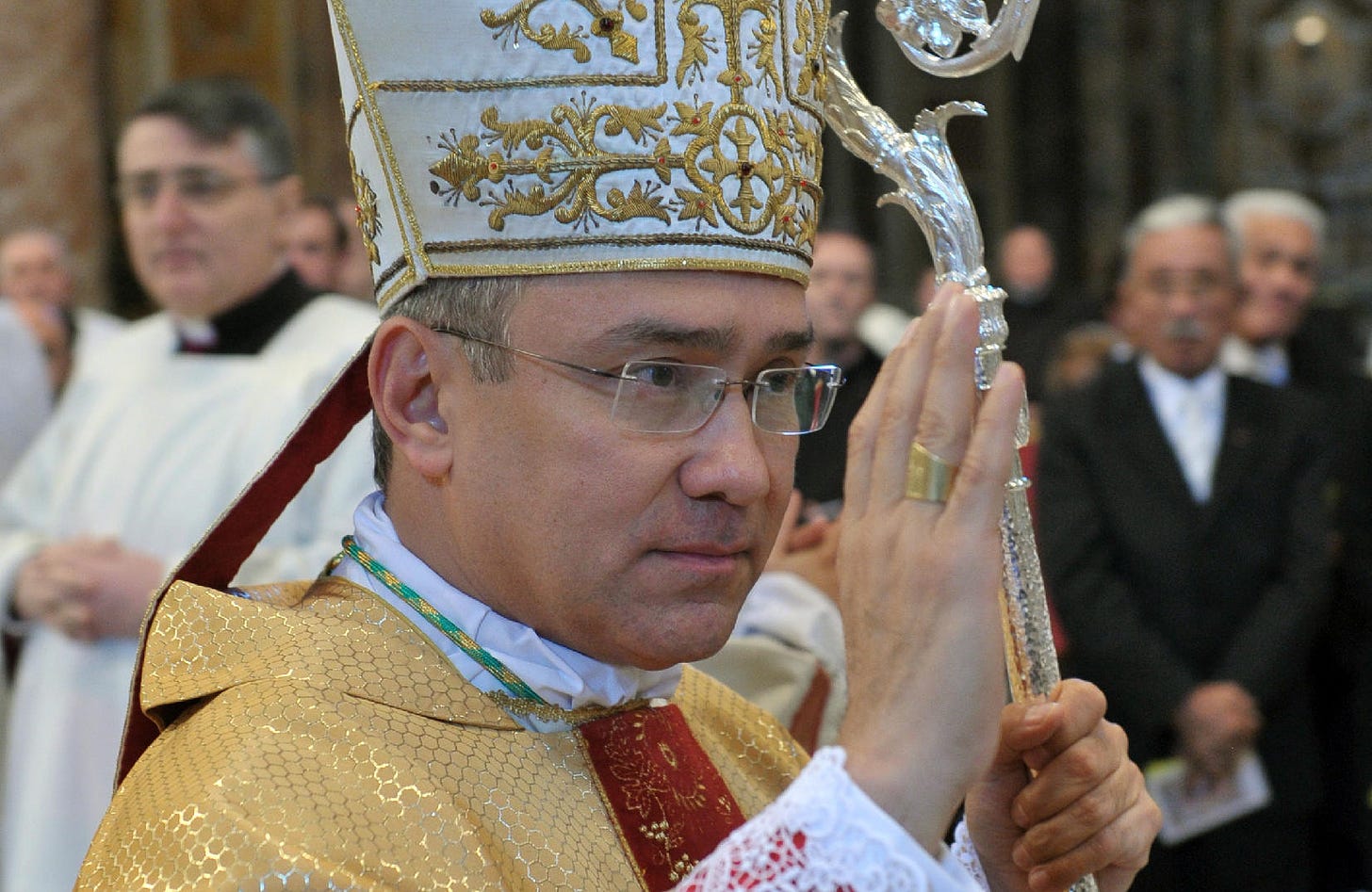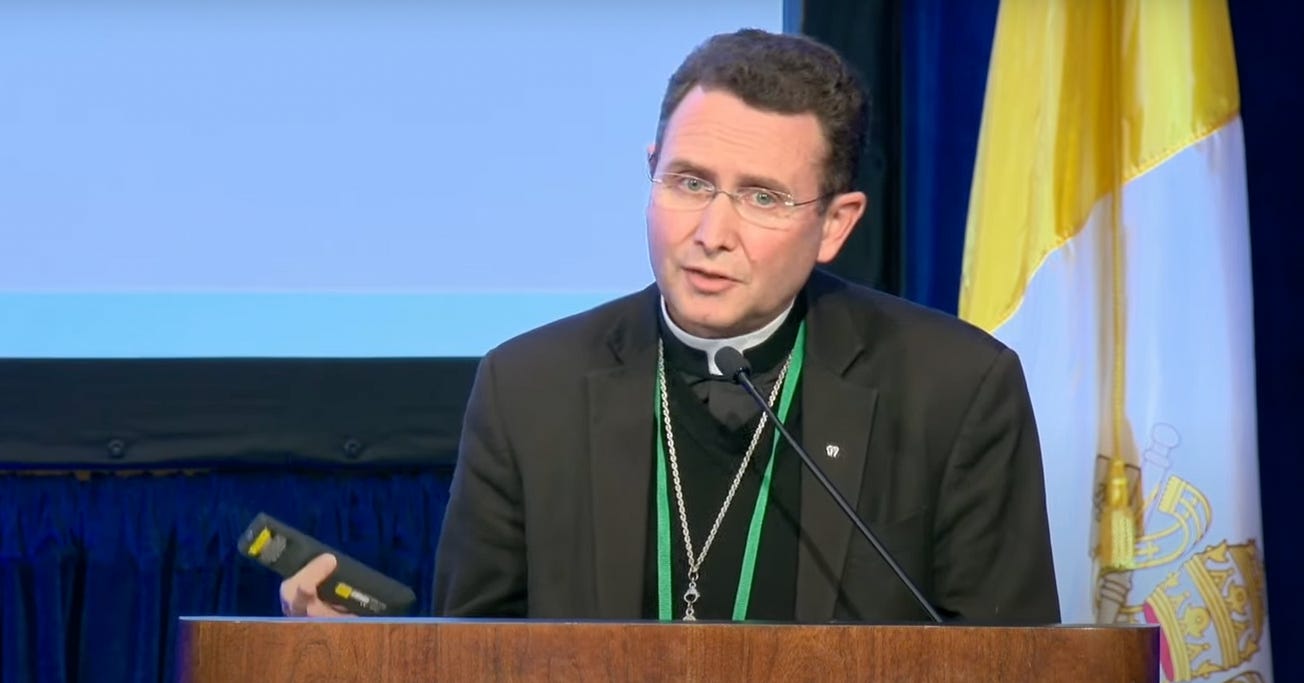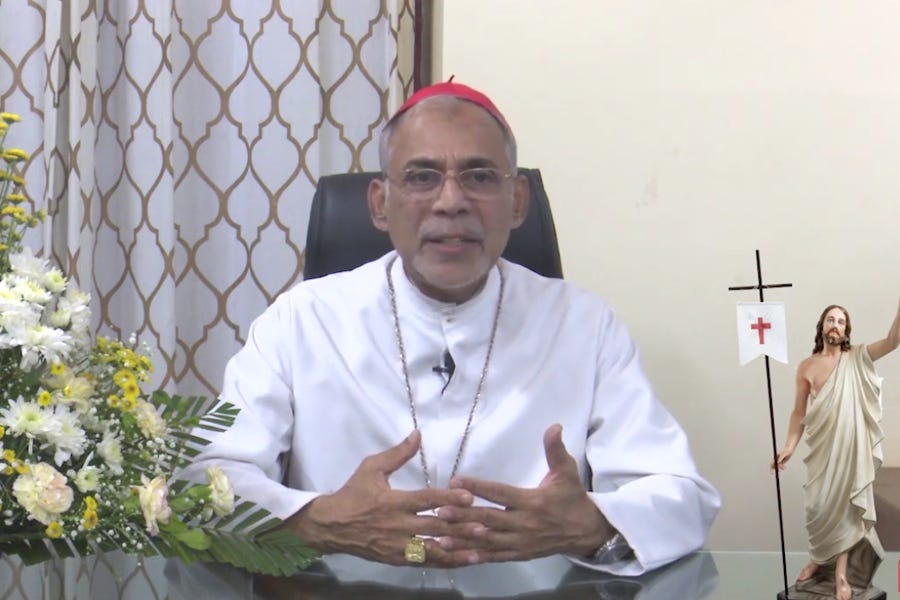A newly emerged memo outlines the state of affairs at the Vatican Secretary of State in 2018, and sheds new light on how a controversial London property deal was approved at the Vatican.
The memo, dated April 13, 2021, was written by Archbishop Edgar Peña Parra, who occupies the sostituto, or deputy, role that had once been occupied by Cardinal Angelo Becciu, who is now facing criminal charges in a sprawling Vatican trial against 10 defendants.
In the memo, Peña Parra writes that at the time of his arrival in the Vatican’s Secretariat of State, “the overall management was aimed at financial speculation and not at the conservative and safe preservation of the assets of the Secretariat of State,” the archbishop wrote.
The document is likely to shift focus at the trial away from the role of Pope Francis in the London deal at its center, and back onto the key prosecution witness, Msgr. Alberto Perlasca.
The memo was first reported Monday by Vatican journalist Sandro Magister. Its contents — a 20-page report written for Vatican investigators — would seem to answer recent suggestions by defense lawyers and media commentators that the pope personally authorized the Secretariat of State’s dealings with Gianluigi Torzi, the businessman who brokered the Vatican’s 2018 purchase of a London development property. Torzi is accused of extorting the Vatican, a charge he denies.
The memo does appear to answer some of the most pressing questions about the financial scandal — especially about how some many senior figures appear to have approved a deal on which the Vatican is set to lose more than a 100 million euros.
But it raises new questions, most pointedly about the prosecution’s decision not to charge Perlasca, who appears to have fought a concerted rear-guard action within the department, following the departure of his former boss, Cardinal Becciu, in 2018.
He has also insisted that Peña Parra sidelined him from the final stages of the London deal, and that it was he who wanted to alert Vatican authorities to the efforts to extort and defraud the secretariat.
Peña Parra’s account also details the way officials acted to stone-wall financial oversight, blind-side superiors with last minute decisions, and deployed accounting sleight-of-hand to cover the true state of the department’s financial affairs.
Despite years of investigations and months of pre-trial hearings, the Secretariat of State has to date remained officially quiet about the charges facing a number of its former officials.
Accusations of financial malpractice and deliberate non-cooperation with financial authorities have been repeatedly denied by the department, but Peña Parra’s report would seem to confirm much of what has been previously reported in the media about the London financial scandal.
A key statement made by the archbishop is that Pope Francis ordered a formal audit of the Secretariat of State’s financial holdings, to be conducted after the departure of Cardinal Angelo Becciu from the office of sostituto in June 2018.
Becciu spent years fending off such auditing efforts from Cardinal George Pell’s Secretariat for the Economy and Libero Milone’s Office of the Auditor General, prior to Pell’s return to Australia and Milone’s sacking in 2017. The news that Francis himself insisted on such an audit, even after Pell, Milone, and Becciu were all out of office, suggests that the pope was interested in Becciu’s old office much earlier than has previously been acknowledged.
Peña Parra reports that the papal-ordered financial audit itself simply never happened. And, according to the sostituto, the person responsible for stalling things was Msgr. Perlasca, now the prosecutors' chief cooperating witness.
According to Magister’s report, Peña Parra says Perlasca justified not holding the audit because the secretariat had “gone through a very difficult time” while Cardinal Pell made efforts to address its finances, and because the auditors “were not persons worthy of trust.”
Meanwhile, the sostituto reports, he found “serious errors” in the accounting of Perlasca’s office which “unjustifiably inflated the value of the assets managed by the Secretariat of State” by nearly a third, and showed a clear pattern of contracts unreasonably favoring the secretariat’s outside partners over Vatican interests.
Peña Parra’s arrival coincided with the culmination of the secretariat’s purchase of the London building at the end of 2018, a deal which he called the “the masterpiece of the administrative office” and seemed to have involved “going to look for the worst in international finance and going into business with them.”
In July last year, Vatican prosecutors formally charged several former officials and businessmen connected to the Secretariat of State, including Cardinal Angelo Becciu, Gianluigi Torzi, and Raffaele Mincione. All three have insisted that the London property deal, which kicked off the investigation and led to the trial, was above board.
Their lawyers have also argued in courts in the Vatican, London, and Rome, that the allegedly fraudulent and extortionary parts of the deal were all approved by relevant authorities at the Vatican, including by Peña Parra, Secretary of State Cardinal Pietro Parolin, and even Pope Francis himself — and at times produced documents to prove it.
This has led to mixed results in court for prosecutors, with a judge in London issuing scathing criticisms of the prosecution’s case, and another in Italy finding that senior officials were effectively duped into signing on to the deal by fraudulent outside legal advice.
Yet, according to the sostituto, it wasn’t just bad advice from external consultants that secured approval for the London deal. In his memo, Peña Parra outlines how Perlasca’s old office would secure approval for transactions without proper scrutiny, describing “a mechanism in which the superior is put under pressure, pushing him to act in haste, portraying ‘catastrophic’ events, such as: ‘If this is not signed immediately there is a risk of losing a great deal of money’.”
Peña Parra says he would have high-level diplomatic meetings interrupted by demands for his signature on financial documents and “the constant leitmotif was that I did not know the ‘machine’ and therefore the reservations I expressed were groundless and only slowed down the work of the administrative office.”
And, Peña Parra says, the same tactic was used to secure Cardinal Parolin’s approval for the final stage of the London deal, and to get the pope to issue his own ‘ok’ — even on the point of approving special extra payments to Torzi to secure control of his Luxembourg holding company.
Pretrial hearings are set to resume in the Vatican court on January 25, at which point prosecutors have been told to refile or drop charges against several of the defendants, following errors of procedure in their initial investigation.
While some media commentators have predicted the entire legal process could be on the verge of collapse, prosecutors have remained adamant that the charges will go to trial.
Perlasca has told prosecutors that he and other departmental officials may have been naive or easily duped in their dealings with businessmen like Raffaele Mincione and Gianluigi Torzi, but that no officials in the secretariat were guilty of corruption — despite charges of corruption having been filed against three former secretariat officials, including Cardinal Becciu.
Prosecutors may now face renewed questions about why, given Peña Parra’s account of Perlasca’s efforts to stymie financial reform and facilitate the very deals which triggered their investigation, they seem to have charged everyone except their star witness.





